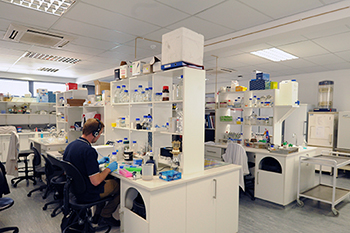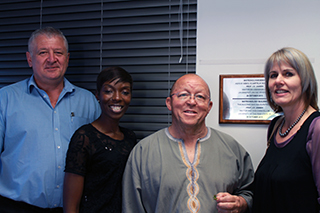Latest News Archive
Please select Category, Year, and then Month to display items
29 August 2024
|
Story Anthony Mthembu
|
Photo Harmse Photography
 Ross van Reenen, CEO of the Toyota Free State Cheetahs.
Ross van Reenen, CEO of the Toyota Free State Cheetahs.
The Business School at the University of the Free State (UFS) recently hosted the CEO of the Toyota Free State Cheetahs, Ross van Reenen, for a guest lecture. Van Reenen presented the guest lecture in the Business School Auditorium on the UFS Bloemfontein Campus on 21 August 2024.
Reflecting on Van Reenen’s address
In a lecture addressed to an auditorium filled with UFS staff and students, Van Reenen’s talk was divided into several sections. Firstly, he spoke about the concept of the ‘black swan’ in reference to the book written by Nassim Nicholas Taleb, titled The Black Swan: The Impact of the Highly Improbable. Referring to Taleb’s book, Van Reenen defined a ‘black swan’ as a rare event that has a severe impact, and the occurrence of which people try to explain. He used some examples to explore this concept as well as its implications, including COVID-19 and its impact on the world, and the tragic death of the people in the Titanic disaster. However, he delved deeper into 9/11 and the extent of its impact, saying that “9/11 was a major wake-up call in the world economy”. Van Reenen highlighted how some companies such as Barclays, for which he previously consulted, had to work to be up and running after the collapse of the Twin Towers in 9/11.
In addition, Van Reenen’s lecture also touched on the importance of the first ninety days of a job after an individual has been employed. “Those first ninety days are crucial, as you have to establish yourself in a company where you are paid less than you are worth,” Van Reenen said. As such, he gave the audience insight into what they could focus on in that time frame. This includes focusing on the small wins, as well as ensuring that you are working at keeping the team together, as the team is an integral part of an organisation.
Van Reenen concluded his address by speaking about his time as the CEO of the Toyota Free State Cheetahs, including some of the decisions he took to ensure the success of the organisation.
UFS launches expansions to Biotechnology Building
2015-11-04
 Biotechnology Building
Photo: Leonie Bolleurs |
To support the strategic focus of the University of the Free State (UFS) on teaching and learning in the field of Biotechnology, the Department of Microbial, Biochemical, and Food Biotechnology introduced upgrades and additions to the value of R23 million to the existing Biotechnology Building on its Bloemfontein Campus. The funding was provided by the Department of Higher Education and Training.
The new section, together with renovations to the existing part of the Biotechnology Building, was opened on Thursday 29 October 2015.
The Department, consisting of three disciplines - Microbiology, Biochemistry, and Food Biotechnology - is extremely diverse. Two of the three disciplines – Microbiology and Biochemistry – are housed in the Biotechnology Building.
Additions and renovations to the Biotechnology Building include:
- Four new research laboratories
- Nine revamped research laboratories
 At the launch of the Biotechnology Building were,
from the left: Nico Janse van Rensburg,
Senior Director: University Estates;
Maureen Khati, University Estates,
Prof Nicky Morgan, Vice Rector: Operations
and Ria Deysel, Director: Facilities Management.
Photo: Leonie Bolleurs
|
The work to the building will have dramatic effects on the quality, as well as the quantity, of postgraduate students. Given the national priority to deliver students, this is very important, particularly at the doctorate level.
Prof Koos Albertyn from the Department said these were the first renovations and expansions done to the building since 1 January 1990. “We welcome the extra space. Forty-six more postgraduate students can now be accommodated in the department,” he said.
Construction took place on the south-western corner of the existing building. Further developments to the building include:
- Six new offices
- A lecture hall for 70 students
- Laboratories that can accommodate 56 postgraduate students
Prof Martie Smit, Academic Head of the Department, said: “This new and refurbished facility enables us to give our best. As academics, we are committed to doing our part in delivering high-quality education at both undergraduate and postgraduate levels to students envisaging a future in biotechnology.”
The James Charles du Preez Seminar Room was also opened at the event. The seminar room is dedicated to Prof Du Preez – who was Head of the Department from October 2002 until the end of 2014. He played a major role in raising funds for upgrading the Biotechnology Building, including the addition of a new wing.